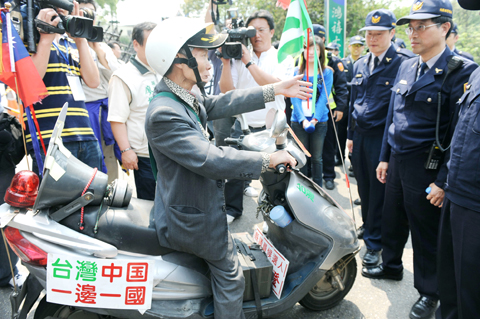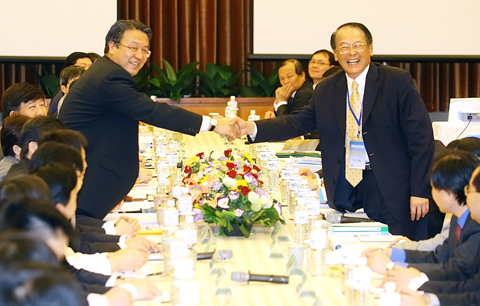|
Scuffles break out over ECFA meeting
'SELL-OUT': While protesters clashed with police, the head
of the Taiwanese delegation tried to reassure the public that it would work to
protect local interests
By Mo Yan-chih and Vincent Y. Chao
STAFF REPORTERS
Thursday, Apr 01, 2010, Page 1

A protester argues with police in Dasi,
Taoyuan County, outside the venue where the second round of negotiations on a
proposed economic cooperation framework agreement (ECFA) between Taiwanese and
Chinese officials was taking place yesterday. The sign on his motorcycle reads
“Taiwan and China, One Country On Each Side.”
PHOTO: LO PEI-DER, TAIPEI TIMES
The second round of negotiations on a proposed economic cooperation framework
agreement (ECFA) with China opened yesterday in Dasi (大溪), Taoyuan County, amid
scuffles between police and protesters who accused the government of attempting
to sell out Taiwan.
The first of the two-day negotiations yesterday focused on the “early harvest”
items proposed for traded goods and services, as well as regulations on the
labeling of product origin and the text of the proposed ECFA.
The “early harvest” list refers to a list of goods and services that will be
subject to immediate tariff concessions or exemptions, which are expected to
form the backbone of the proposed deal.
Bureau of Foreign Trade Director-General Huang Chih-peng (黃志鵬), the head of the
Taiwanese delegation, said negotiations on the text were almost done, and the
two sides would continue discussions on the early harvest items and product
origin labels today.
“The two sides exchanged ideas and had deep discussions on the impact of an ECFA
on industries on both sides. Our stances are getting closer, and we will
continue the negotiations with sincerity and flexibility,” he said in a press
briefing after a full-day of negotiation at Ta Shee Resort in Dasi.

Tang Wei, director of the Taiwan, Hong Kong
and Macau Affairs Department under China’s Ministry of Commerce, left, and
Taiwan’s Bureau of Foreign Trade (BFT) Director-General Huang Chih-peng shake
hands at the start of the second round of negotiations on a proposed economic
cooperation framework agreement (ECFA) in Taoyuan County yesterday.
PHOTO: CNA
Huang said the Taiwanese delegation reiterated its stance on limiting imports of
Chinese agricultural products and not opening the market to Chinese workers.
Taiwan also stressed that it would not consider including traditional industries
on the early harvest list and would protect the interests of small and medium
businesses, he said.
Machinery, textiles, petrochemicals, as well as automobiles and related
components, are expected to be on Taiwan's early harvest list. The two sides
also discussed service businesses that could be included in the list.
Huang declined to comment whether the Taiwanese delegation made any compromises
on the list during the negotiations. He said the delegation requested that China
consider the difference in the scope of the markets and industries on both sides
when negotiating items.
Straits Exchange Foundation (SEF) Vice Chairman Kao Koong-liang (高孔廉) said later
yesterday during a dinner banquet for the Chinese delegation that Taiwan would
make sure that traditional industries would not be affected after the ECFA is
signed.
Tang Wei (唐煒), head of the Department of Taiwan, Hong Kong and Macau under
China's Ministry of Commerce, said the two sides would seek to reach consensus
on the early harvest list based on the principle of “fast, easy and less” —
dealing with easy issues before contentious ones, and limiting the scope of the
early harvest list so that a consensus can be reached soon.
“[An] ECFA is neither a panacea nor a curse ... We will put the interests of the
general public and local business into consideration in negotiating an ECFA,” he
said.
Promoting the benefits of an ECFA, Tang said 271 free-trade agreements had been
signed around the world but no country had been marginalized as a result of
these pacts.
Early yesterday morning, about 100 protesters arrived from nearby towns and
cities to protest outside the venue of the meeting, saying the controversial
agreement would pave the way for eventual unification with China.
Hundreds of police officers — some in full riot gear — set up barricades and
closed down roads, turning the quaint countryside resort into what some
protesters likened to “a military camp.” Several rounds of clashes later took
place as protesters attempted to break through the barbed wired barricades and
police guarding entry into the resort.
The protesters dispersed at noon following repeated warnings by police, but
gathered again early in the afternoon, yelling slogans and burning Chinese
flags.
“President Ma Ying-jeou (馬英九) and the ECFA are selling Taiwan out,” “Taiwan and
China are two different countries” and “ECFA needs a nationwide referendum,” the
crowd chanted.
The clashes were the latest in a long string of headaches for the government
which has expressed optimism that it can complete negotiations on the agreement
before the end of June.
The timing and location of yesterday's talks were heavily criticized by the
opposition after the government only announced the venue on Monday — two days
before the start of the negotiations.
DPP legislators said the remote location was chosen to limit the amount of
protesters at the scene, while other said the Ma government was downgrading
Taiwan's status by deciding not to hold the meeting in Taipei.
The two sides held the first round of negotiations in January in Beijing.
Kao said the SEF chose to hold the event outside Taipei “purely because we could
not find enough rooms for delegation members in the city,” as the timing of the
negotiations was not determined until several days ago.
Although, no serious injuries were reported at press time, several protest
organizers later alleged there had been instancesof police brutality. A group of
Taoyuan County DPP councilors said they were hit by police officers during the
morning scuffles.
DPP headquarters, however, rejected reports that it was involved in the
protests, saying it did not have plans to launch protests over the trade
agreement.
“It's too early to talk about protests. The DPP will discuss such actions
pending the outcome of the government's attitude on holding an ECFA debate and
nationwide referendum,” DPP Chairperson Tsai Ing-wen (蔡英文) said.
The DPP has accused the Ma administration of ignoring public opinion after the
government rebuffed its earlier calls to hold a referendum on the proposed pact.
A recent poll conducted by the DPP showed that 45.8 percent of respondents were
against signing the proposal, while 34.9 percent supported it.
Critics oppose the ECFA amid fears that it would jeopardize Taiwan's sovereignty
and make it too economically dependent on China.
Both the DPP and the Taiwan Solidarity Union have been pushing for a referendum
on the issue.
Sources from the DPP said that Presidential Office Secretary-General Liao
Liou-yi (廖了以) would meet DPP Secretary-General Su Jia-chyuan (蘇嘉全) at an
undisclosed location today to hammer out details on the upcoming talks between
Ma and Tsai.
The DPP has called for a “debate” on the proposed ECFA, but the Presidential
Office said it would prefer a “discussion” of the issue.
|
![]()
![]()